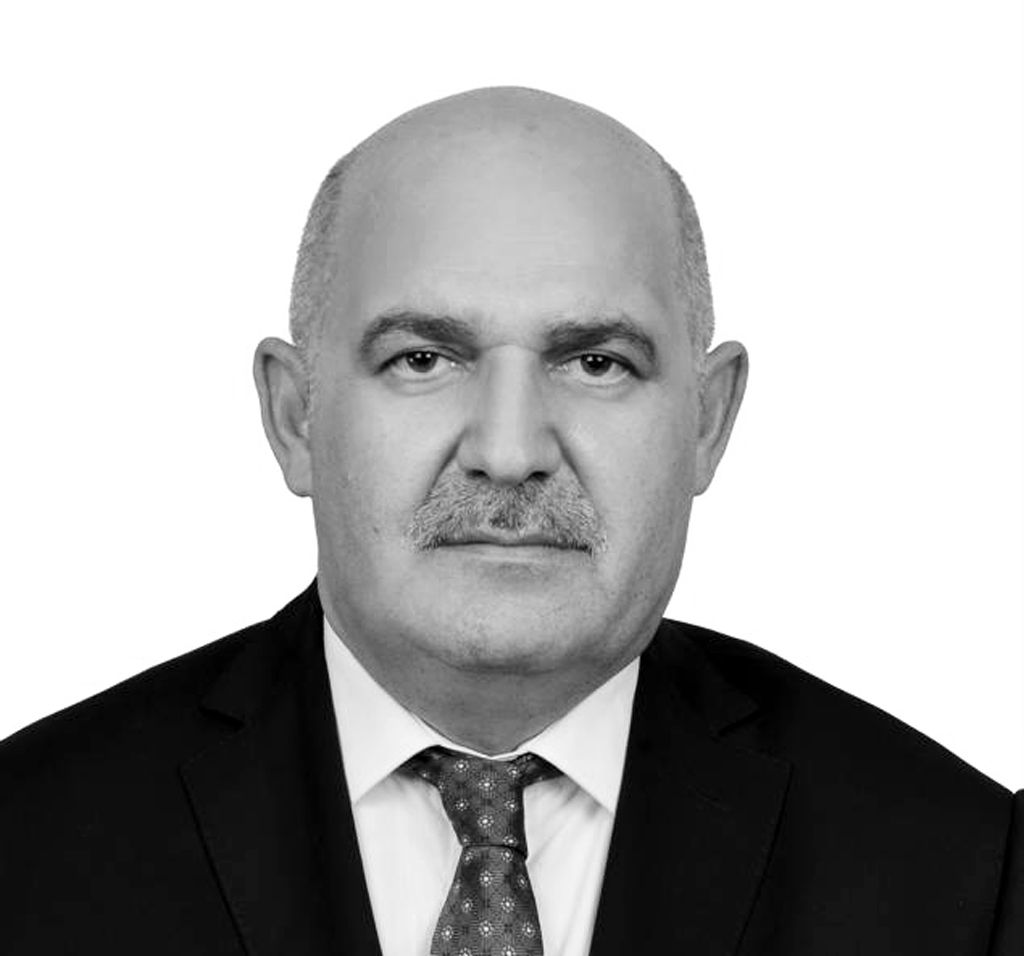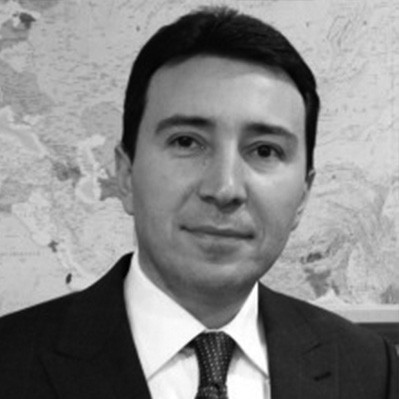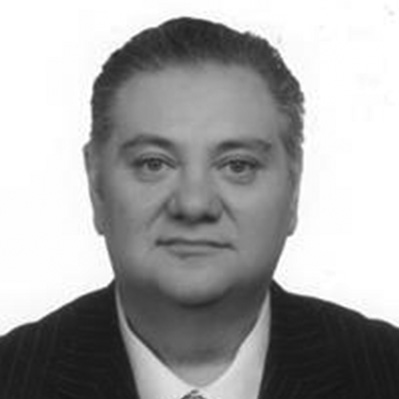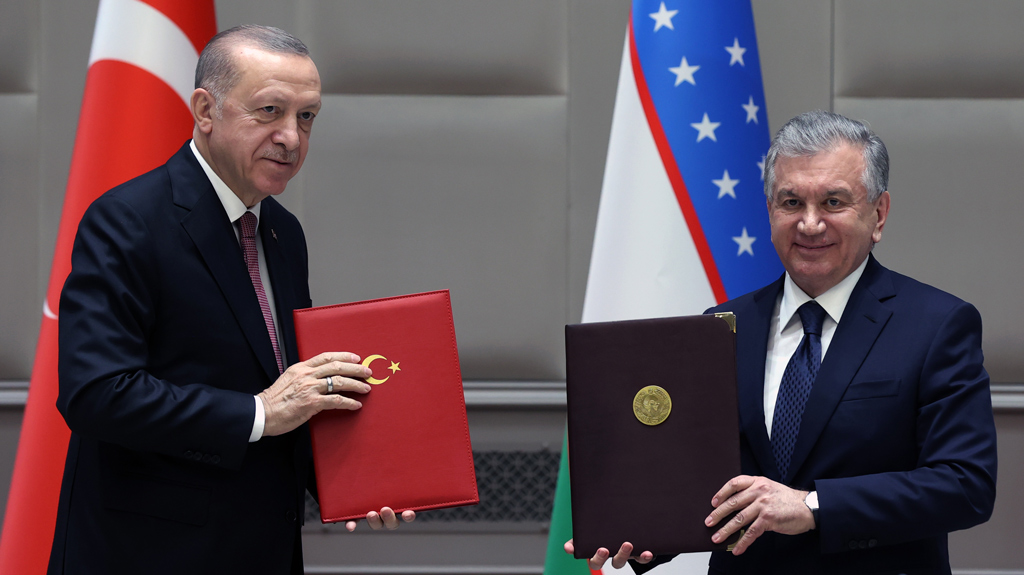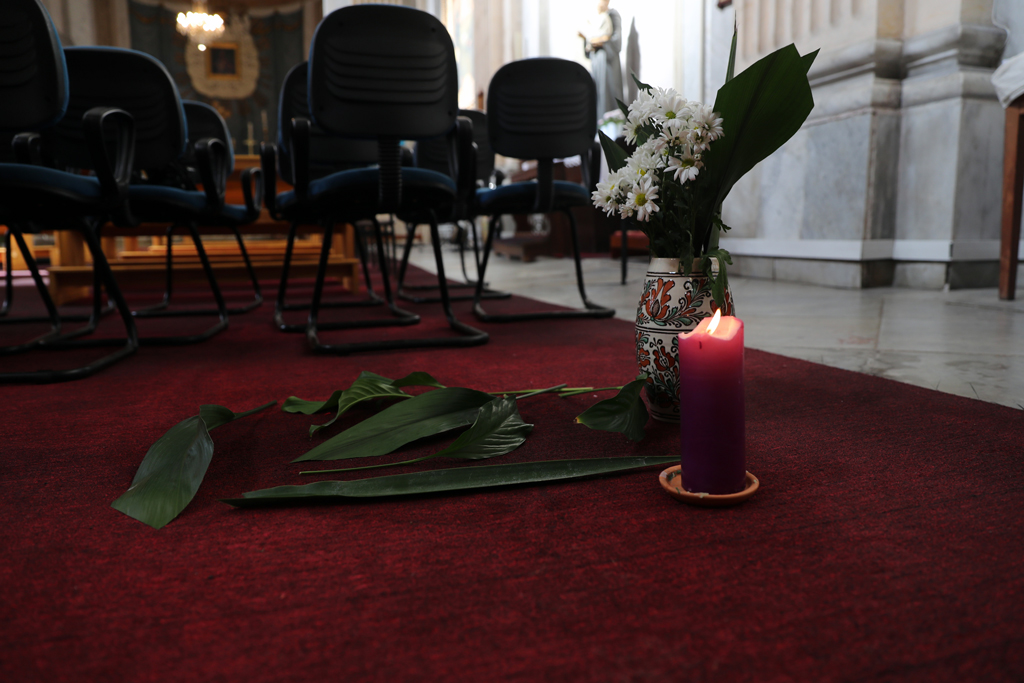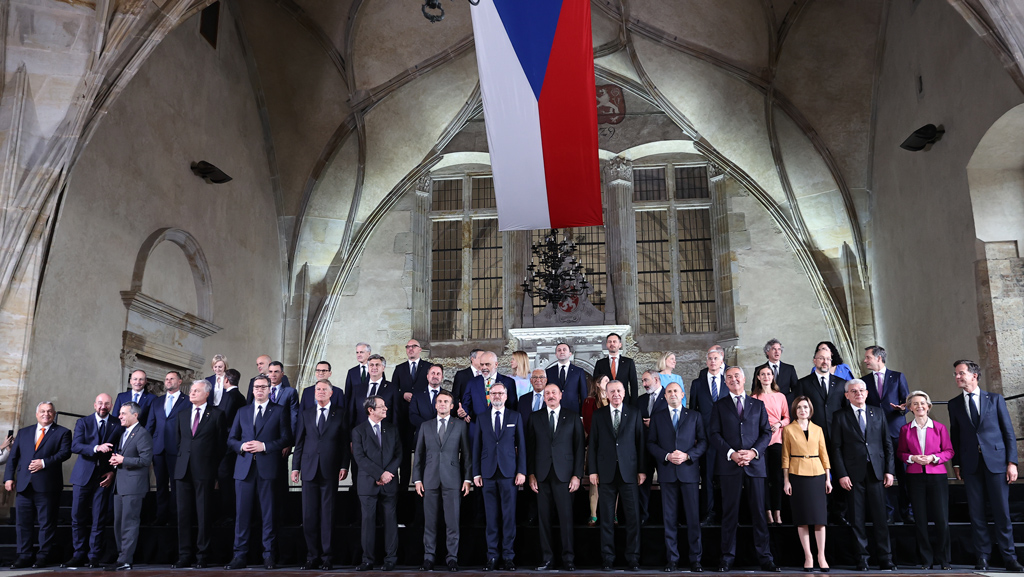The bilateral relations between Uzbekistan and Turkey have reached the level of strategic partnership in recent years. During that period, the two countries strengthened their political and economic cooperation, facilitating the emergence of additional opportunities. In this regard, Turkey and Uzbekistan, which are important members of the Organization of Turkic States, have more than tripled their annual trade volume over the last five years.
Turkish President Recep Tayyip Erdoğan’s visit on March 29-30, 2022 is expected to take his country’s relationship with Uzbekistan to the next level. During his visit, Erdoğan also attended the Uzbekistan-Turkey High-Level Strategic Cooperation Council’s second meeting. To make sense of the Turkish president’s visit to Uzbekistan and its implications for bilateral relations as well as regional affairs, we hereby present the opinions of five leading experts. Prepared by Gloria Shkurti Özdemir Experts Mehmet Yüce Fırat Purtaş İlyas Topsakal Kutluk Kağan Sümer Yaşar Sarı Mehmet Yüce
Azerbaijan State University of Economics
Thanks to its geopolitical and geostrategic location, culture and civilization, and population and economic potential, Uzbekistan represents a crucial country for Central Asia and Turkey. Located at the heart of Central Asia, the country shares land borders with all other states in the region. Uzbekistan happens to be in the middle of the steppe, deserts, and mountains, and at the intersection of major transport and trade routes – which makes its location strategically important. Having been a center of Islamic civilization for many years, it brings together the intense richness of the Turkish, Persian, and Arab cultures. The Turkish-Islamic civilization’s development resulted in the emergence of many prominent figures in the fields of science, literature, philosophy, and the arts, including the Great Imam Abu Hanifa, Imam Maturidi, Imam al-Bukhari, Baha’al-Din Naqshband, Ali Qushji, and Ali-Shir Nava’i – icons of the Turkish-Islamic world. Consequently, Uzbekistan – a key Central Asian country with more than 35 million citizens, its geostrategic location, its vast history, its rich cultural heritage, and economic potential – has a distinguished place in the Turkic world. A strong relationship between Turkey and Uzbekistan would build synergy in the Turkish-Islamic world and lay the groundwork for many significant steps. Therefore, President Erdoğan’s visit to Uzbekistan was rather important for creating the infrastructure for future steps and giving additional momentum to the relationship.
Over the years, Turkey’s relations with Uzbekistan, which occupies a distinguished place in the Turkish people’s hearts, experienced certain ups and downs in line with other developments. However, the bilateral relationship gained momentum thanks to the open policy of Shavkat Mirziyoyev, Uzbekistan’s recently elected president, and President Erdoğan’s special efforts, and reached the level of ‘strategic partnership’ in 2017. In addition to creating an important opportunity for cooperation, the Turkish leader’s visit represented a strong statement of support for Uzbekistan – which became the target of negative propaganda and a policy of suppression from certain groups, which claimed that the country could experience something akin to the unpleasant events that unfolded in Kazakhstan. At the same time, Erdoğan’s trip built strong synergy for activating Uzbekistan’s potential that could allow that country to assume a leadership position in the region.
Moreover, the Turkish president’s visit should be expected to strengthen his country’s economic relations with Uzbekistan, a country with a large and dynamic population known for its spirit of entrepreneurialism, and contribute to efforts to increase their bilateral trade volume to $5 billion. At the same time, it is likely to promote stronger cooperation in the area of defense and give significant momentum to ongoing activities in the area of education.
Back to top
Mehmet Yüce
Azerbaijan State University of Economics
Thanks to its geopolitical and geostrategic location, culture and civilization, and population and economic potential, Uzbekistan represents a crucial country for Central Asia and Turkey. Located at the heart of Central Asia, the country shares land borders with all other states in the region. Uzbekistan happens to be in the middle of the steppe, deserts, and mountains, and at the intersection of major transport and trade routes – which makes its location strategically important. Having been a center of Islamic civilization for many years, it brings together the intense richness of the Turkish, Persian, and Arab cultures. The Turkish-Islamic civilization’s development resulted in the emergence of many prominent figures in the fields of science, literature, philosophy, and the arts, including the Great Imam Abu Hanifa, Imam Maturidi, Imam al-Bukhari, Baha’al-Din Naqshband, Ali Qushji, and Ali-Shir Nava’i – icons of the Turkish-Islamic world. Consequently, Uzbekistan – a key Central Asian country with more than 35 million citizens, its geostrategic location, its vast history, its rich cultural heritage, and economic potential – has a distinguished place in the Turkic world. A strong relationship between Turkey and Uzbekistan would build synergy in the Turkish-Islamic world and lay the groundwork for many significant steps. Therefore, President Erdoğan’s visit to Uzbekistan was rather important for creating the infrastructure for future steps and giving additional momentum to the relationship.
Over the years, Turkey’s relations with Uzbekistan, which occupies a distinguished place in the Turkish people’s hearts, experienced certain ups and downs in line with other developments. However, the bilateral relationship gained momentum thanks to the open policy of Shavkat Mirziyoyev, Uzbekistan’s recently elected president, and President Erdoğan’s special efforts, and reached the level of ‘strategic partnership’ in 2017. In addition to creating an important opportunity for cooperation, the Turkish leader’s visit represented a strong statement of support for Uzbekistan – which became the target of negative propaganda and a policy of suppression from certain groups, which claimed that the country could experience something akin to the unpleasant events that unfolded in Kazakhstan. At the same time, Erdoğan’s trip built strong synergy for activating Uzbekistan’s potential that could allow that country to assume a leadership position in the region.
Moreover, the Turkish president’s visit should be expected to strengthen his country’s economic relations with Uzbekistan, a country with a large and dynamic population known for its spirit of entrepreneurialism, and contribute to efforts to increase their bilateral trade volume to $5 billion. At the same time, it is likely to promote stronger cooperation in the area of defense and give significant momentum to ongoing activities in the area of education.
Back to top
 Fırat Purtaş
Ankara Hacı Bayram Veli University
President Recep Tayyip Erdoğan’s visit to Uzbekistan coincided with the 30th anniversary of diplomatic relations between the two countries. Turkey, which was the first nation to recognize Uzbekistan’s independence, established diplomatic relations with that country by opening its embassy on March 4, 1992. The bilateral relationship was elevated to the level of “strategic partnership” with the conclusion of an agreement in 2017. During the visit, which took place on March 29-30, 2022, the two presidents attended the second meeting of the Turkey-Uzbekistan High Level Strategic Cooperation Council. Indeed, Presidents Erdoğan and Shavkat Mirziyoyev must be identified as the architects of the current chapter in bilateral relations, which continue to improve with great dynamism, that started in late 2016. After all, President Erdoğan visited Uzbekistan in November 2016, while Mirziyoyev was still acting president, and built a personal relationship with his counterpart. After that initial contact, the two leaders met many times during official visits and at international summits.
On October 25, 2021, Uzbekistan held a presidential election, in which Shavkat Mirziyoyev was re-elected for five years by receiving 80.1 percent of the vote. Having earned the world’s respect by implementing key reforms, the Uzbek president’s education, health care, economic and democratization policies receive strong support from his country’s population as well. Building the New Uzbekistan with a comprehensive reform program called the “Third Renaissance,” Mirziyoyev’s open and multi-dimensional foreign policy attaches special importance to cooperation with Turkey. Indeed, Turkey contributes to Uzbekistan’s development in many areas, starting with trade, investments, banking, tourism, health care, and higher education.
One of President Mirziyoyev’s top priorities has been to establish transport corridors between Uzbekistan, a land-locked country, and major ports – which, in turn, would strengthen that nation’s ties to the world. In this context, it is of vital importance for that country to participate in trans-Caspian transportation and energy projects. Uzbekistan, which joined the Organization of Turkic States in October 2019, thus focuses on promoting trade and mutual investments with fellow member states.
Cultural affinity is yet another important dimension in bilateral relations. The cultural policies of Turkey and Uzbekistan – which are part of the Turkic world’s integration-oriented organizations like the International Organization of Turkic Culture (TÜRKSOY), the Parliamentary Assembly of Turkic-Speaking Countries (TURKPA), and the Organization of Turkic States – serve to reinforce mutual trust among them. Specifically, both Erdoğan and Mirziyoyev attach special importance to young people. Hence a series of joint initiatives intended to shelter the youth from extremism and radical movements, and give them access to high-quality education in sync with their own values. For example, Turkey is among the supporters of the Imam Bukhari International Scientific Research Center, an educational and research institution established in Samarkand. Turkey and Uzbekistan are also expected to jointly launch a university in the near future.
Uzbekistan monitored closely the Taliban takeover and the subsequent formation of an interim government in Afghanistan. Turkey and Uzbekistan, which work together on bilateral and multilateral platforms, have been engaging in active diplomatic efforts to restore Afghanistan’s stability. The two countries, which adopted a similar approach toward ending the war between Ukraine and Russia and promoting peace in that region, have contributed to regional and global security by forming a “stability belt” with their neighbors. In this sense, President Erdoğan’s visit to Uzbekistan must be viewed as an important development for bilateral relations as well as the future geopolitics of Greater Eurasia.
Back to top
Fırat Purtaş
Ankara Hacı Bayram Veli University
President Recep Tayyip Erdoğan’s visit to Uzbekistan coincided with the 30th anniversary of diplomatic relations between the two countries. Turkey, which was the first nation to recognize Uzbekistan’s independence, established diplomatic relations with that country by opening its embassy on March 4, 1992. The bilateral relationship was elevated to the level of “strategic partnership” with the conclusion of an agreement in 2017. During the visit, which took place on March 29-30, 2022, the two presidents attended the second meeting of the Turkey-Uzbekistan High Level Strategic Cooperation Council. Indeed, Presidents Erdoğan and Shavkat Mirziyoyev must be identified as the architects of the current chapter in bilateral relations, which continue to improve with great dynamism, that started in late 2016. After all, President Erdoğan visited Uzbekistan in November 2016, while Mirziyoyev was still acting president, and built a personal relationship with his counterpart. After that initial contact, the two leaders met many times during official visits and at international summits.
On October 25, 2021, Uzbekistan held a presidential election, in which Shavkat Mirziyoyev was re-elected for five years by receiving 80.1 percent of the vote. Having earned the world’s respect by implementing key reforms, the Uzbek president’s education, health care, economic and democratization policies receive strong support from his country’s population as well. Building the New Uzbekistan with a comprehensive reform program called the “Third Renaissance,” Mirziyoyev’s open and multi-dimensional foreign policy attaches special importance to cooperation with Turkey. Indeed, Turkey contributes to Uzbekistan’s development in many areas, starting with trade, investments, banking, tourism, health care, and higher education.
One of President Mirziyoyev’s top priorities has been to establish transport corridors between Uzbekistan, a land-locked country, and major ports – which, in turn, would strengthen that nation’s ties to the world. In this context, it is of vital importance for that country to participate in trans-Caspian transportation and energy projects. Uzbekistan, which joined the Organization of Turkic States in October 2019, thus focuses on promoting trade and mutual investments with fellow member states.
Cultural affinity is yet another important dimension in bilateral relations. The cultural policies of Turkey and Uzbekistan – which are part of the Turkic world’s integration-oriented organizations like the International Organization of Turkic Culture (TÜRKSOY), the Parliamentary Assembly of Turkic-Speaking Countries (TURKPA), and the Organization of Turkic States – serve to reinforce mutual trust among them. Specifically, both Erdoğan and Mirziyoyev attach special importance to young people. Hence a series of joint initiatives intended to shelter the youth from extremism and radical movements, and give them access to high-quality education in sync with their own values. For example, Turkey is among the supporters of the Imam Bukhari International Scientific Research Center, an educational and research institution established in Samarkand. Turkey and Uzbekistan are also expected to jointly launch a university in the near future.
Uzbekistan monitored closely the Taliban takeover and the subsequent formation of an interim government in Afghanistan. Turkey and Uzbekistan, which work together on bilateral and multilateral platforms, have been engaging in active diplomatic efforts to restore Afghanistan’s stability. The two countries, which adopted a similar approach toward ending the war between Ukraine and Russia and promoting peace in that region, have contributed to regional and global security by forming a “stability belt” with their neighbors. In this sense, President Erdoğan’s visit to Uzbekistan must be viewed as an important development for bilateral relations as well as the future geopolitics of Greater Eurasia.
Back to top
Istanbul University Located at the heart of Central Asia, Uzbekistan, the only country that shares land borders with all the other states in that region (e.g. Kazakhstan, Kyrgyzstan, Tajikistan, and Turkmenistan) has immense geopolitical importance and facilitates all transit between those countries. Furthermore, the country, home to 34.2 million people, has the highest population density in the region and reminds its neighbors of history thanks to the historical awareness of its culture. Whereas gold remains Uzbekistan’s most important mineral, the country is one of the few nations to enjoy self-sufficiency in terms of underground sources. At the same time, Uzbekistan has vast agricultural potential by virtue of being located between the Amu Darya and the Syr Darya. In recent years, therefore, it made a lot of investments in high technology farming and, more broadly, agriculture. The country’s top trading partners, ranked by their respective share in foreign trade, include China, Russia, and Turkey. Yet joint initiatives in the areas of agriculture, information and communication technologies, socio-cultural relations, and education promise to tilt that balance in Turkey’s favor. Thanks to President Erdoğan’s strong interest and special efforts, Turkish and Uzbek ministries implement joint projects in various areas and aim to synchronize the human resources of the two nations through joint centers of innovation. Uzbekistan, which became independent in the aftermath of the Soviet Union’s disintegration, appears to have made more progress in its nation-building process than other countries. At the same time, the ancient cities of Tashkent, Bukhara, and Samarkand, which have immense cultural value from a historical perspective as former trade hubs, keep the spirit of Central Asia alive. The abundance of physical cultural assets and educational institutions – key components of nation-building – make a positive impact on that process and deserve attention as a source for nearby countries. Shavkat Mirziyoyev, who served as prime minister between 2003 and 2016, was elected president as a politician beloved by the Uzbek people. President Mirziyoyev, who remains in office, overhauled his country’s domestic politics and foreign policy, giving remarkable momentum to Uzbekistan’s development drive and administrative regulations through his open and multi-dimensional approach to foreign policy. Whereas the country’s multi-dimensional foreign policy was primarily intended to promote its economic development, it enabled the development of all countries in the region. In this sense, Uzbekistan’s working group with Kazakhstan, Kyrgyzstan, and Turkmenistan laid the groundwork for very significant projects. At the same time, the number of Tashkent’s joint initiatives with Russia and China keeps increasing. Turkey, Kazakhstan, and South Korea, in turn, are among Uzbekistan’s remaining partners in joint projects. The country, whose economy recorded an average growth of 20 percent under President Mirziyoyev, was among the few nations around the world to keep growing amid the coronavirus pandemic in 2020. Another important dimension of Uzbekistan’s multi-directional foreign policy relates to its activities under the umbrella of multilateral organizations. In this regard, the country built strong relationships with the Organization of Turkic States, the Commonwealth of Independent States, and the Shanghai Cooperation Organization. A closer look at the nature of those organizations would reveal how Uzbekistan implements its balanced foreign policy vision. At the same time, Tashkent aims to minimize the region’s security problems and maintain some level of control over unstable places like Afghanistan, Tajikistan, and the south. Furthermore, Uzbekistan represents the most important intersection on the historical route between Europe, on one hand, and China, Central Asia, and Russia on the other. It preserves that legacy, which enables it to play a central role in Chinese and other logistical projects whilst serving as Central Asia’s gateway to the world. In this regard, Uzbekistan’s geopolitical importance should be expected to grow over the years, as the land-locked country could serve as a transit point – a center of trade, transportation, and energy between the relevant markets. The impact of irregular migration, which was triggered by the United States' withdrawal from Afghanistan, on Uzbekistan, however, could present certain serious challenges for the country and the broader region. That is because the Uzbek army could possibly find it difficult to maintain domestic safety in case of a violent conflict. That the country is not a member of the Collective Security Treaty Organization (CSTO) enables it to pursue somewhat autonomous policies and to launch joint projects in that area with major regional powers including Turkey. Back to top
Back to top
Back to top



